|
Hay bandas que no siguen los clichés establecidos por las bandas del Death Metal, sino que quieren retomar su propio camino, y una de ellas es Horrendous. Los norteamericanos empezaron haciendo death metal, pero no tardaron en desviarse por caminos progresivos y extravagantes para los fieles servidores de lo lúgubre. Este año han lanzado su segundo disco con la todopoderosa Seasons of Mist, ‘Ontological Mysterium’. Glibert V. mantuvo una entrevista con su batería Jamie Knox acerca del disco y algunas cosas más… ¡Descubridlo vosotr@s mism@s! MF: ¡Bienvenidos a Metal Friends! Un placer tenerte aquí, antes que nada. ¿Cómo van las cosas en Horrendous? ¿Cómo va la promoción del nuevo disco "Ontológical Mysterium"? J: La respuesta ha sido bastante buena en general. Apreciamos todos los comentarios y se siente un poco como un disco de regreso desde que "IDOL" existió hace tanto tiempo. MF: De "Ontological Mysterium" sacaron varios singles, aunque las canciones tienen conexiones entre sí, son diferentes, ¿qué nos puedes decir? J: El disco no es un álbum conceptual, aunque varias de las canciones tratan sobre la transformación y la aceptación del cambio, pero también surgen los peligros de un cambio desenfrenado. El disco se siente como una unidad completa, a pesar de la falta de conexión lírica intencional en todo momento. MF: En "Ontological Mysterium"; la música y el sonido tiene una atmósfera especial, ¿de qué manera crees que ha evolucionado en su sonido y vuestro estilo a la hora de tocar Metal? J: Hemos seguido desafiándonos a nosotros mismos a lo largo de los años, tanto como intérpretes como como compositores, y eso ha llevado a una evolución gradual en el sonido. A medida que crecemos como oyentes, finalmente incorporamos perspectivas más amplias a nuestra propia música. Y normalmente se nos considera una banda de death metal, pero no nos preocupa ceñirnos a la mayoría de los tropos del género. En cambio, intentamos crear algo que parezca nuestro, algo que nos refleje. MF: En varias canciones de "Ontological Mysterium" tienen escalas musicales diferentes a las que normalmente se usan o tocan dentro del Metal Extremo, ¿están abierto a la hora de inspirarse y crear ideas con otros estilos de música distintos al Metal? J: Sí, en este punto somos bastante abiertos y rara vez descartamos ideas porque sean demasiado extrañas, no nos preocupamos por ser "Metal" hoy en día, aunque todavía somos claramente una banda de metal. Hemos mejorado cada vez más en dejar fluir nuestras ideas y nuestra inspiración subconsciente, y seguimos para ver a dónde nos lleva. MF: Horrendous tiene un tipo de vibración oscura en su música pero muy diferente a muchas bandas dentro del Death Metal, ¿qué tema lírico usaron por ejemplo para "Ontological Mysterium"? J: Normalmente no escribimos las típicas letras "oscuras" o "malvadas" que sueles encontrar en el Death Metal. Todavía usamos lenguaje en ese ámbito, pero las canciones tienden a tener un enfoque introspectivo y están más preocupadas por la experiencia personal o la filosofía/creencias. MF: Las portadas de la mayoría de vuestros discos siempre me han llamado la atención. Horrendous no usa su logo en la portada. ¿Por qué? ¿Existe algún tema específico con algún significado especial? J: No hay un tema específico en ninguna de nuestras portadas. El artista Brian Smith ha hecho todas nuestras portadas desde Ecdysis, y le dejamos tener libertad para crear lo que le parezca adecuado. Él hizo las portadas de "Ecdysis" y "Anareta" desde cero (sin ninguna dirección nuestra), y elegimos las portadas de los dos últimos álbumes de un conjunto de sus trabajos existentes. No ponemos nuestro logo en la portada porque sentimos que el arte debería valerse por sí solo: el arte de la portada es una dimensión extra completa del álbum, y la complejidad y profundidad de las pinturas se arruinarían con un logo de Death Metal (en nuestra opinión). MF: La primera vez que os escuché fue con "Ecdysis", pero vuestro primer álbum es muy diferente al resto de vuestros discos. ¿Cómo ha cambiado la forma de componer y desarrollar el concepto de vuestros álbumes? J: Al principio solíamos componer mucho en grupo: todos componíamos las canciones a la vez. A medida que la vida se ha vuelto más ajetreada y nos separa la distancia, la situación ha ido evolucionando. Ahora, Matt es el principal escritor en cuanto al desarrollo de ideas y conceptos básicos. Yo suelo desarrollar esas ideas con él, y luego llevamos lo que tenemos al grupo para seguir desarrollando la canción y darle los últimos retoques. MF: Te confieso que cuando salió "Idol" no lo entendí, luego con el tiempo he aprendido a valorarlo y creo que es un disco vital en vuestra discografía. ¿Cuál es tu opinión? J: Creo que Idol fue un disco "dormido" para mucha gente. Por alguna razón, se convirtió en un disco denso que requiere mucho tiempo para digerirlo y desplegarlo, como tal, no es tan divertido de inmediato en las primeras escuchas, pero sí creo que muchas personas que pasaron tiempo con el disco se han convertido en fans. Por supuesto, a algunas personas simplemente no les gusta el disco, lo cual está bien, tiene un tono y una estructura muy específicas, uno que no creo que podamos recrear incluso si lo intentáramos de nuevo. MF: ¿Cómo ha sido ese salto de un sello dirigido a un público más especializado como Dark Descent Records a uno con más cobertura como Seasons Of Mist? J: Season of Mist ha sido útil para presentarnos a nuevas audiencias; como dijiste, Dark Descent es un poco más específico, con menos huella global. Nos lo pasamos muy bien con Dark Descent y todavía amamos a Matt Calvert, pero en ese momento tenía sentido pasar a un sello con diferentes prioridades y capacidades. MF: ¿Qué planes a futuro tenéis en relación a las actuaciones en directo para festivales europeos, ¿puedes contarnos algo? J: No tenemos planes actuales en vivo para festivales en Europa. No tenemos un agente europeo y la realidad es que rara vez nos invitan a tocar en Europa (en parte porque no tenemos agente). Dicho esto, siempre estamos interesados en tocar allí. Tocamos en un festival en Europa: "Graveland Fest" en los Países Bajos en 2019, con suerte, volveremos a Europa pronto. MF: La música Metal ya no es como en el pasado, muchas cosas han cambiado. En Norteamérica muchas bandas están tomando el relevo que dejaron otras: Blood Incantation, Necrot, Tomb Mold, Ascended Dead, Tomb Mold, Horrendous, entre otras. ¿Qué me puedes decir? J: Muchas bandas hoy en día se contentan con reproducir lo que ya se hizo en los años 80 y 90. Esto es lamentable, ya que nos deja a todos los fanáticos sin opciones de escuchas interesantes, hay muchas excepciones, algunas de las cuales tú mencionas, pero nos esforzamos en hacer las cosas a nuestra manera y en escribir música que se sienta fiel a nosotros mismos. Queremos que nuestra música se sienta parte de nosotros, en lugar de un reflejo de ídolos del pasado. Hay una gran diferencia entre influencia e imitación. MF: ¿Cómo afectan o contribuyen las descargas o el streaming gratuitos en línea a una banda de Metal? J: Me imagino que esto lleva a que menos personas compren nuestra música, pero estoy seguro de que más personas descubren nuestra banda debido a la disponibilidad de nuestra música a través de cosas como la transmisión. Así que supongo que ayuda y perjudica al mismo tiempo, pero este sistema llegó para quedarse y no me preocupo mucho por eso. MF: ¿Cómo está la salud de Metal Extremo actualmente? ¿Sigues lo que está pasando y las diferentes manifestaciones del Metal? ¿Qué puedes decirnos o comentar? J: Bueno, ciertamente parece ser más popular que nunca, diré que no sigo las corrientes subyacentes demasiado de cerca, ya que Horrendous tiende a existir principalmente fuera de lo que está de moda (para bien o para mal). Me alegra que mucha gente disfrute de estos géneros, no estoy seguro de cuánto durará esta popularidad, pero la burbuja probablemente explotará en algún momento. MF: Los miembros de Horrendous también tocan o han tocado en otros proyectos musicales, ¿qué nos puedes contar sobre The Silver? J: The Silver fue un proyecto iniciado por Matt y Enrique de Crypt Sermon/Daeva. Querían hacer música que tuviera más carga emocional y algo de influencia de Black Metal (en comparación con Horrendous). Finalmente me uní para tocar el bajo porque necesitaban a alguien. Nuestro segundo álbum probablemente se lanzará el próximo año, ya que lo estamos terminando ahora. Considero que Horrendous y The Silver son completamente diferentes, con poca superposición conceptual y musical entre los dos, los riffs y las letras de The Silver nunca podrían existir en Horrendous, y viceversa. MF: ¡Terminamos la entrevista! Puedes mandar un mensaje a todo el que lea esto. Éxitos. ¡¡¡¡Horrendas Rules!!!! J: ¡Gracias a todos los lectores por tomarse el tiempo y gracias por la entrevista! ENGLISH INTERVIEW MF: Welcome to Metal Friends! A pleasure to have you here, first of all. How are things in Horrendous? How is the promotion of the new album "Ontológical Mysterium"? J: The response has been pretty good overall. We appreciate all the feedback, and it feels a bit like a comeback record since IDOL was so long ago. MF: From "Ontological Mysterium" you released several singles, although the songs have connections with each other, they are different. What can you tell us? J: The record is not a concept album, although several of the songs deal with transformation and embracing change. But the dangers of unchecked change comes up as well. The record does feel like a complete unit, despite a lack of intentional lyrical connection throughout. MF: In "Ontological Mysterium"; the music, the sound has a special atmosphere, in what way do you think you have evolved in your sound and your style of Metal? J: We've continued to challenge ourselves over the years, both as players and writers, and that has led to a gradual evolution in sound. As we grow as listeners, we ultimately incorporate wider perspectives into our own music. And we are typically considered a death metal band, but we are not concerned with sticking to most of the genre tropes. Instead, we try to craft something that feels like our own - something that reflects us. MF: In several songs on "Ontological Mysterium" they have different musical scales than those normally used or played within Extreme Metal, are you open when it comes to being inspired and creating ideas with other styles of music other than Metal? J: Yes at this point we are quite open, and we rarely throw out ideas because they are too strange. We don't worry about being "metal" these days, although we are still clearly a metal band. We've been getting better and better at letting our ideas and subconscious inspiration flow, and we follow to see where it takes us. MF: Horrendous has a type of dark vibration in your music but very different from many bands within Death Metal, what lyrical theme did you use for example for "Ontological Mysterium"? J: We don't normally write the typical "dark" or "evil" lyrics that you tend to find in death metal. We still use language in that realm, but the songs tend to have an introspective focus and are more concerned with personal experience or philosophy/beliefs. MF: The covers of most of your albums have always caught my attention. Horrendous doesn't use your logo on the cover, why? Is there a specific theme with some special meaning? J: There is no specific theme on any of our covers. Artist Brian Smith has done all of our covers since Ecdysis, and we let him have the freedom to create whatever he sees fit. He did the covers for "Ecdysis" and "Anareta" from scratch (without any direction from us), and we chose the covers for the last two albums from a pool of his existing work. We didn't put our logo on the cover because we felt the artwork should stand on its own: the cover art is a whole extra dimension of the album, and the complexity and depth of the paintings would be ruined by a Death Metal logo (in our opinion). MF: The first time I heard you was with "Ecdysis", but your first album is very different from the rest of your other albums. How has the way of composing and developing the concept of your albums changed? J: In the early days, we tended to do a lot of writing together as a group - songs were crafted by all of us at once. As life has gotten busier and we are now separated from each other by distance, the situation has gradually evolved. Now, Matt is the primary writer in terms of developing basic ideas and concepts. I usually flesh out those ideas with him, and then we bring what we have to the group for further song development and finishing touches. MF: I confess when "Ídol" came out I didn't understand it, then over time I have learned to appreciate it and I think it is a vital album in your discography. What is your opinion? J: I think Idol was a "sleeper" record for a lot of people. For whatever reason, it became a dense record that takes a lot of time to digest and unfurl. As such, it isn't as immediately fun on the first few listens. But I do think many people that spent time with the record have become fans. Of course, some people just don't like the record, which is fine. It has a very specific tone and structure, one that I don't think we could recreate even if we tried. MF: How has that jump been from a label aimed more at a specialized audience like Dark Descent Records to one with more coverage like Seasons Of Mist? J: Season of Mist has been useful for introducing us to new audiences - like you said, Dark Descent is a bit more niche, with less of a global footprint. We had a great time with DD, and we still love Matt Calvert, but it made sense at that point to move to a label with different priorities and capabilities. MF: What future plans do you have in relation to live performances for European festivals, can you tell us something? J: We do not have current live plans for festivals in Europe. We don't have a European agent, and the reality is that we rarely get asked to play in Europe (partly because we have no agent). That being said, we are always interested in playing over there. We did play one festival in Europe - Graveland Fest in the Netherlands back in 2019. Hopefully we'll make it to Europe again sometime soon. MF: Metal music is no longer like the past, many things have changed. In North America many bands are taking the baton left by others: Blood Incantation, Necrot, Tomb Mold, Ascended Dead, Tomb Mold, Horrendous, among others.What can you tell me? J: Many bands these days are content reproducing what has already been done in the 80s and 90s. That is unfortunate, since it leaves all of us fans without interesting listening choices. There are plenty of exceptions, some of which you name, but we make a point to do things our own way, and to write music that feels true to ourselves. We want our music to feel like a part of us, instead of a reflection of past idols. There is a difference between influence and imitation. MF: How do free online downloads or streaming affect or contribute to a Metal band? J: I imagine it leads to fewer people buying our music, but I'm sure more people discover our band due to the availability of our music via things like streaming. So, I suppose it both helps and hurts. But this system is here to stay, and I don't worry that much about it. MF: How is the health of Extreme Metal currently? Do you follow what is happening and the Metal manifestations? What can you tell us or comment? J: Well, it certainly seems to be more popular than ever. I'll say that I don't follow the undercurrents too closely, as Horrendous tends to exist mostly outside of what is trendy (for better or worse). I'm glad that a lot of people are getting enjoyment from these genres. I'm not sure how long this popularity will last, but the bubble will probably burst at some point. MF: Members of Horrendous also play or have played in other musical projects, what can you tell us about The Silver? J: The Silver was a project started by Matt and Enrique from Crypt Sermon/Daeva. They wanted to make music that is more emotionally charged and has some black metal influence (compared to Horrendous). I eventually joined to play bass since they needed someone. Our second album will likely be released next year, as we are finishing it now. I consider Horrendous and The Silver to be wholly different, with little conceptual and musical overlap between the two. Riffs and lyrics in The Silver could never exist in Horrendous, and vice versa. MF: We finished the interview! You can send a message to everyone who reads this. Successes. Horrendous Rules!!!! J: Thanks to any readers for taking the time and thanks for the interview! https://horrendous.bandcamp.com https://www.facebook.com/HorrendousDeathMetal https://seasonofmist.bandcamp.com https://www.season-of-mist.com METAL FRIENDS Texto y traducción: Glibert V.
0 Comentarios
Deja una respuesta. |
Archivos
Julio 2024
|

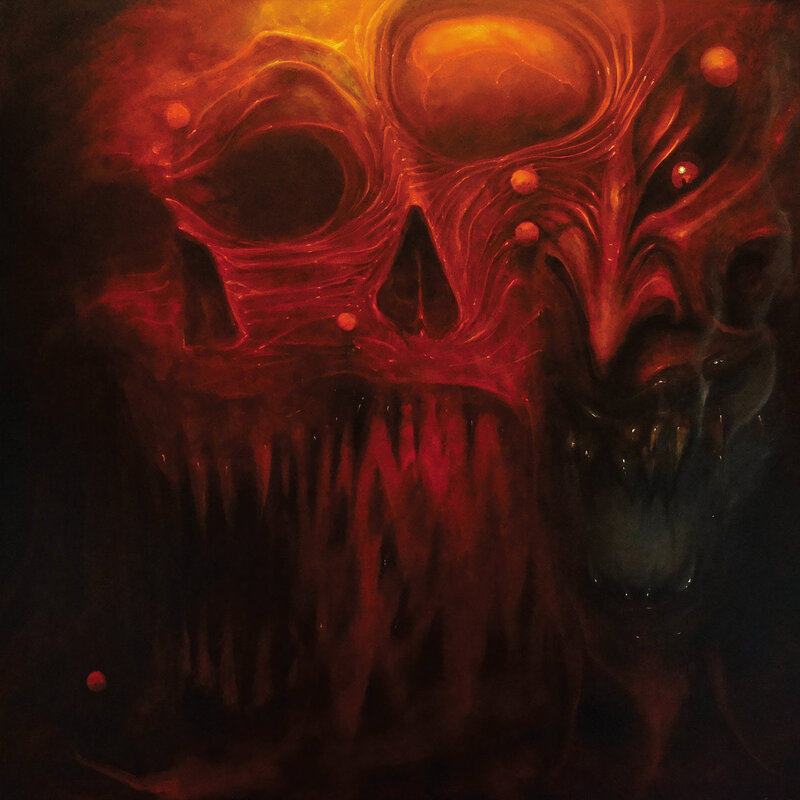
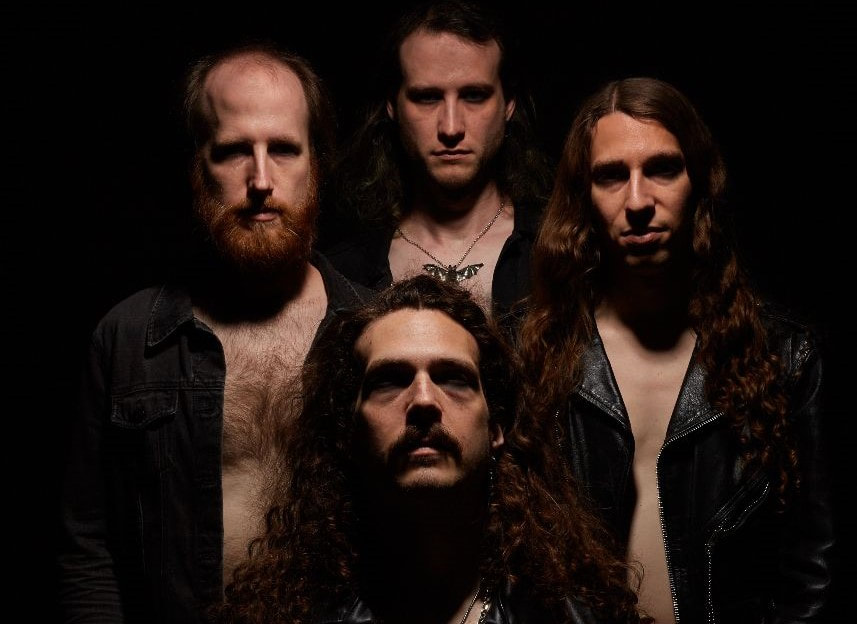
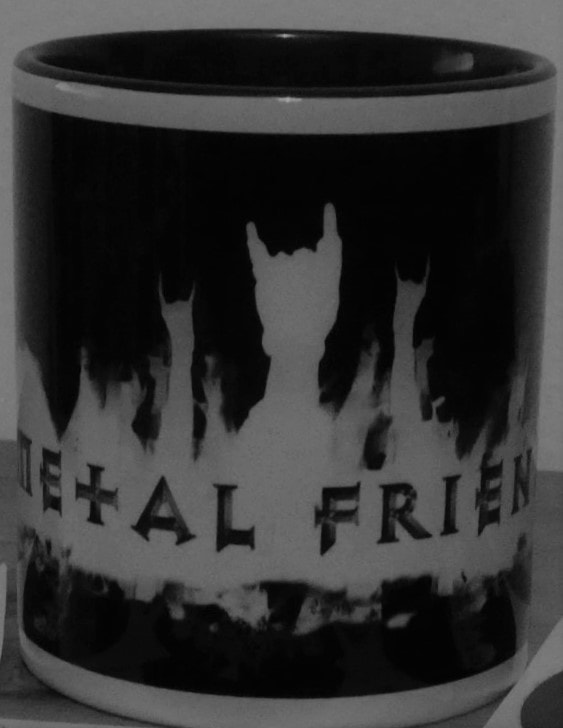

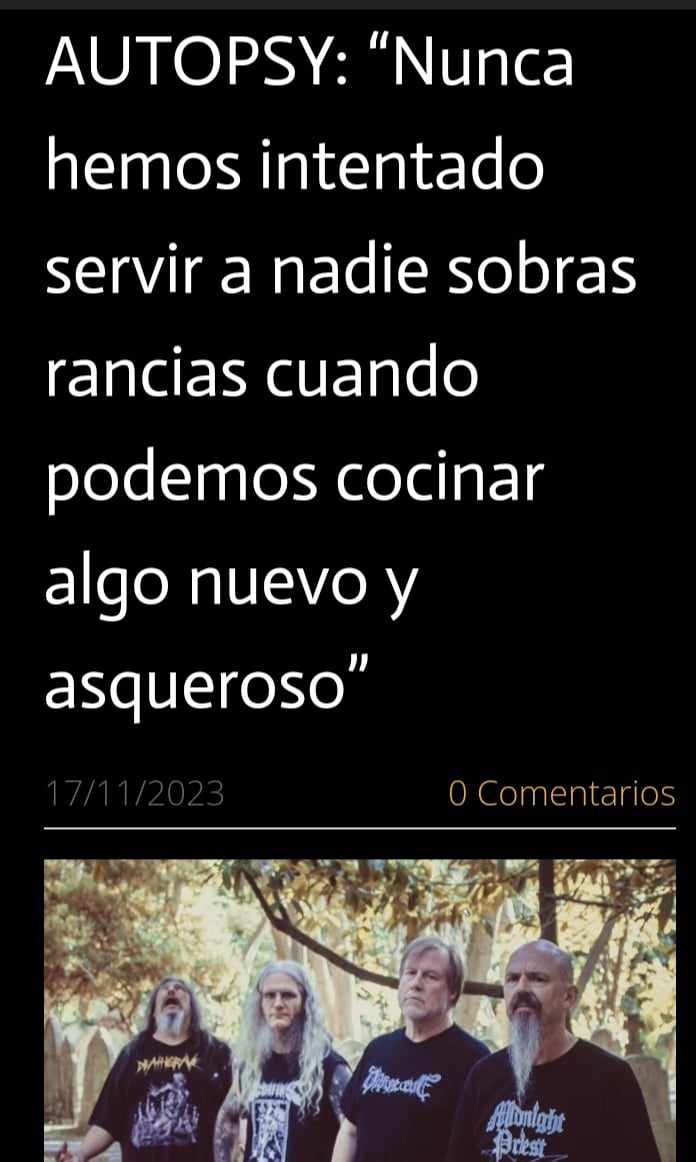
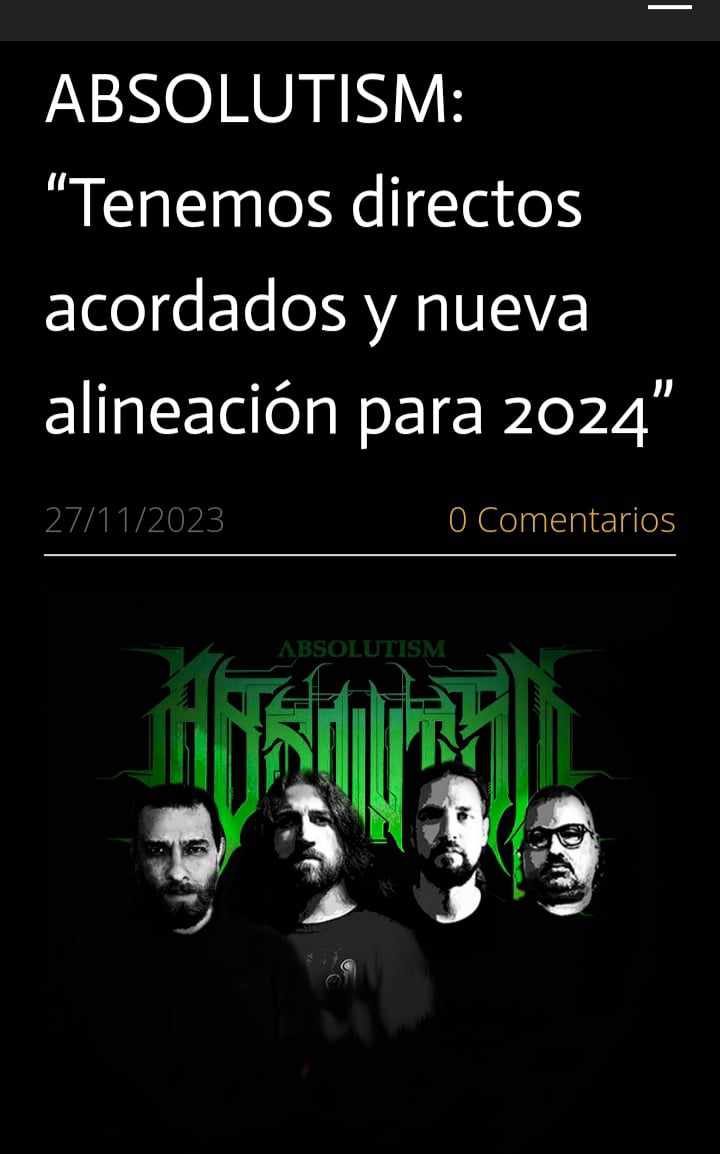
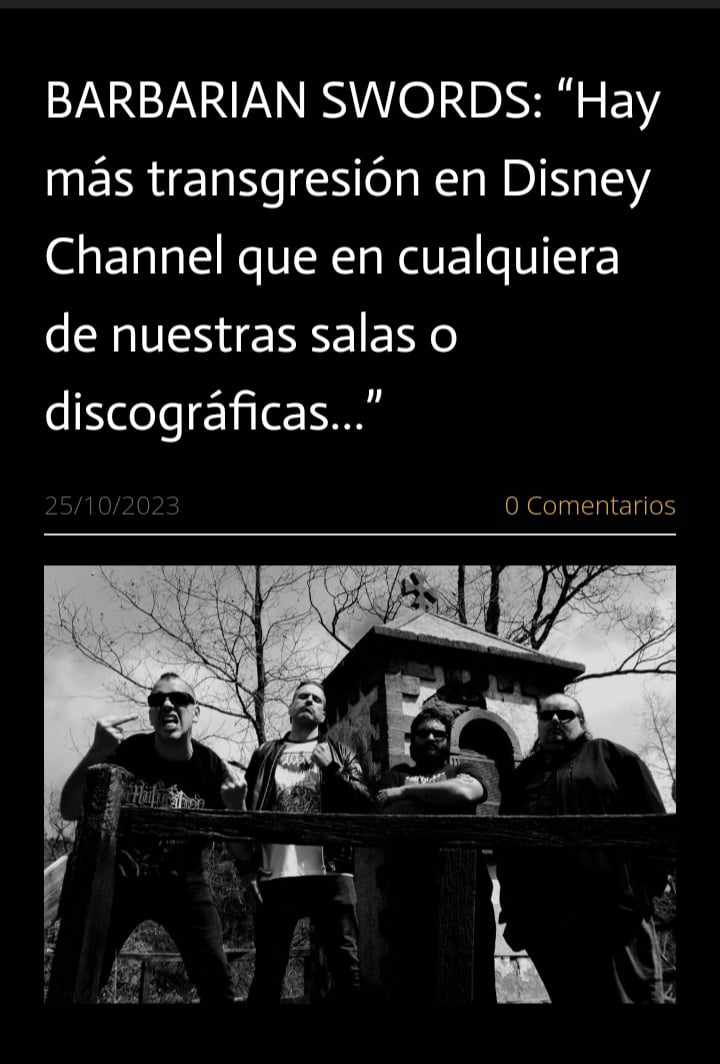
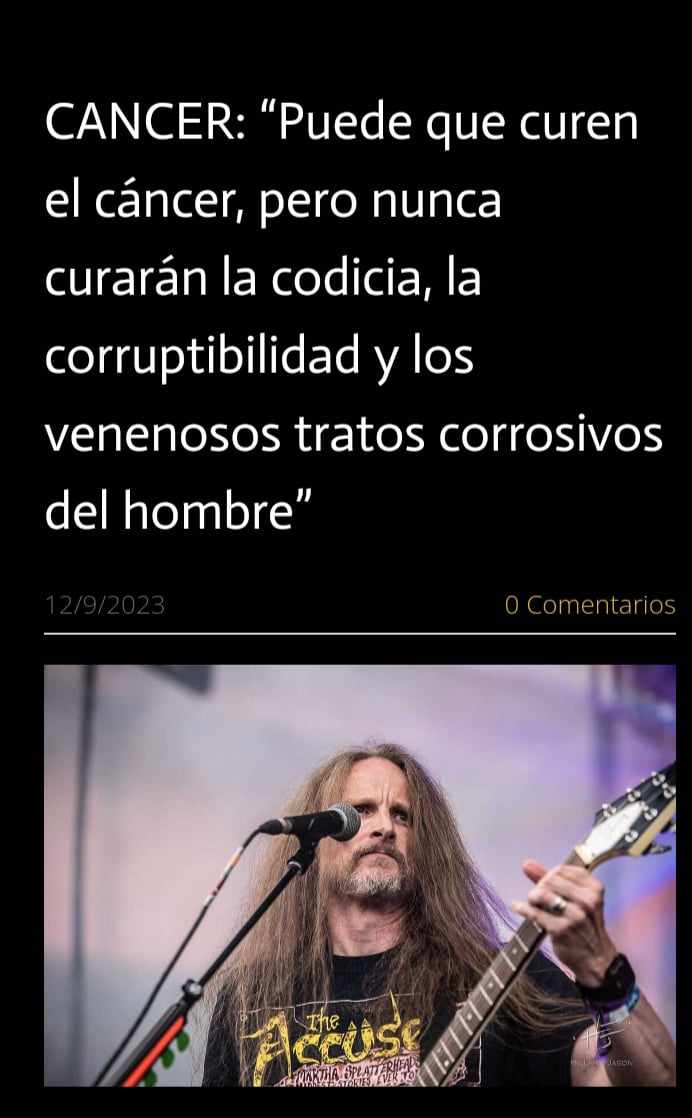
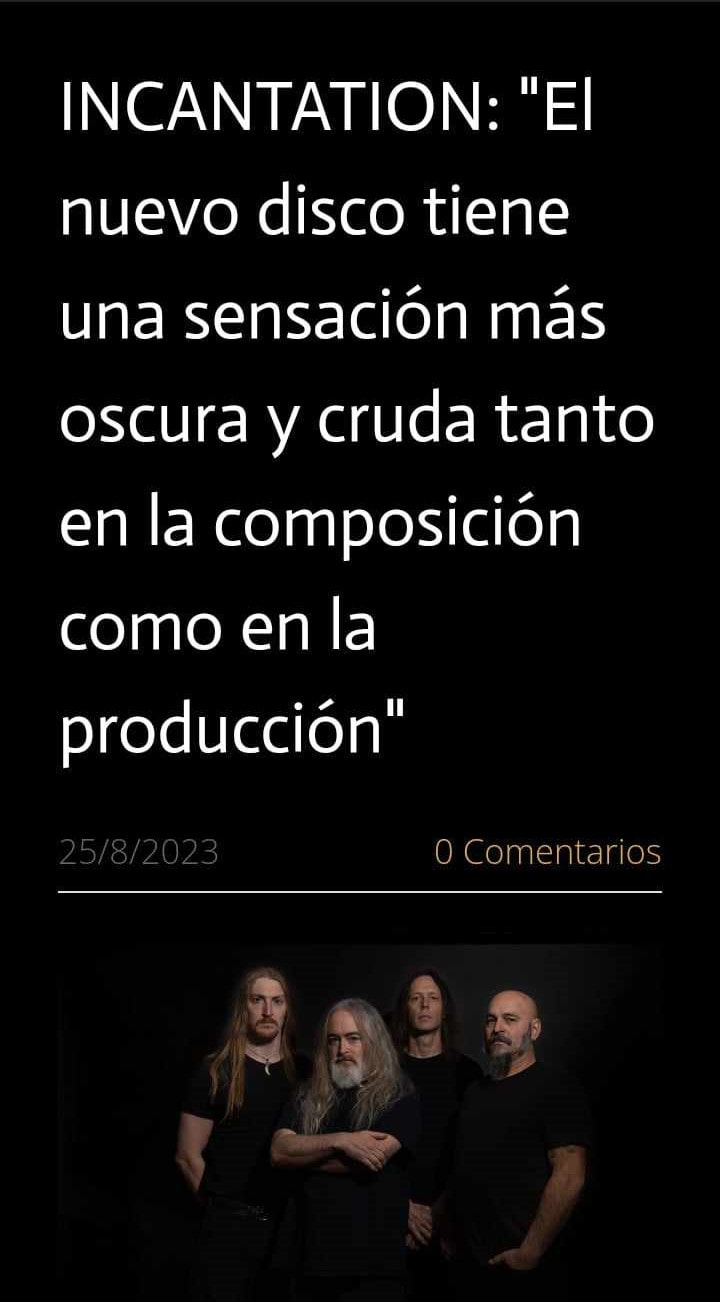
 Canal RSS
Canal RSS